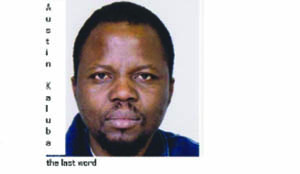 What is so special about being white, being educated, and living in an urban area, being male, being young, being religious or even being alive?
What is so special about being white, being educated, and living in an urban area, being male, being young, being religious or even being alive?
Yet human beings have used all these identities and more to seclude others as being inferior, not belonging or even deserving death.
The subject of otherness has been a hot discussion in social sciences and remains the basis of ills like racism, tribalism, sexism, xenophobia, the Aryan race claim and Euro-centrism in the 20th Century.
What is otherness? Lisa Onbelet in her paper imagining the Other: The Use of Narrative as an Empowering Practice defines Otherness as being anyone or anything that is not me.
A human being, (I have avoided using mankind because of its sexist connotation in leaving out women) being a selfish animal starts by looking at his or her individual self to define others.
Since no two people are the same, there should be caution in understanding the ‘other’ using individuality, gender, ethnicity, race, religion or any other identifier.
As a group, the issue of ‘otherness’ becomes even a more complicated to practise since historically human beings have used a certain measure to identify themselves.
Europeans had problems understanding non whites without using the European standards of judgement in what has now been termed as euro centrism.
This is a tendency to interpret the histories of non-European societies from a European (or Western) perspective.
In Africa, they referred to the local people as natives or tribes. These words are pregnant with negative connotations of ‘otherness’
Up to now, the western world has continued to look down on ‘other’ cultures that are different from theirs. Even the practice of studying other cultures like Masaais, Aborigines, and Inuits has been deemed as racist.
However, it is not only the Europeans who are guilty of judging others using themselves as a yardstick of positive attributes, all societies use the otherness measure to exclude people who do not belong.
Note that despite Africa being the most insulted continent, some Africans like Egyptians, Tunisians, Algerians and other North Africans feel they are not Africans.
They feel despite belonging to Africa geographically, culturally and socially they are far much superior to most Africans in sub Saharan Africa.
Even some of our African friends in South Africa despite complaining of the apartheid regime feel the system has helped them to be above other Africans who got independence in the 60’s.
Thus they employ the ‘otherness’ yardstick of economical advancement and being exposed to the western systems to look down other African countries up north.
This is one of the sources of xenophobia that exposes other Africans who go down South since the new comers are easily identified using the yardstick of otherness that employs language, skin colour and other physical attributes.
Even blacks who complain of racism in dominantly white societies like Britain and the United States of America are guilty of segregating other blacks from Africa.
They use the same yardstick of superiority based on social advancement that a white man uses against blacks.
Isn’t it strange to note the corrosive effects of otherness which is an invention constructed by society to exclude and push away people who are different from the self to a lower social position?
The otherness criteria abound in all tribes in Zambia since all of them have a word to describe an outsider or a foreigner.
For Bembas it is umutulatulafye- outsider, anthu a waka –chi-Tumbuka (people of nothingness), kimanyukunyuku-siLozi for foreigner, abena fyalo-valley Bisas of Mpika.
Even Africans who complained of the word ‘native’ in both colonial and Post-colonial Zambia had derogatory words for white settlers.
The common derogatory words for white settlers and Indians included Mwisa for whites and nsamya for Asians respectively.
In religious circles the issue of ‘otherness’ has sometimes reached violent levels especially between Muslims and Christians.
Even within the Christian circles in countries like Zambia, different churches sometimes despise each other using the ‘otherness’ yardstick.
They sometimes do this using derogatory names for other churches eg Chimpempe (Seventh Day Adventists) Chitawala ( Jehovah’s Witnessess) Ba Free Church ( UCZ) ba Katolika (Roman Catholic) Ba Pente. Until we learn to tolerate our differences, the issue of otherness will always be a fertile ground for conflict.
Throughout humanity, otherness has invented words like gentiles, kaffirs, Niggers, untouchables, osus and ‘outsiders.’
These groups who perceptibly belong to the ‘other’ are usually ostracised because of their pronounced ‘otherness.’
One would wonder why groups of people who judge other using their yardstick as a referral point.
It explains why the late Jamaican reggae star Bob Marley penned the famous lines –you refuse to be what you wanted us to be.






